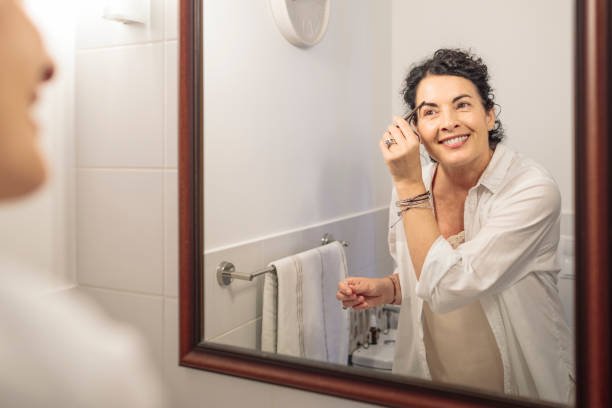As women enter menopause, the skin often becomes one of the first and most visible places where hormonal changes show. Reduced estrogen levels lead to a decrease in collagen, elastin, and skin hydration causing dryness, fine lines, sagging, and increased sensitivity. Menopause can also trigger adult acne, dark spots, and unwanted facial hair, while making existing skin conditions more noticeable.
These changes aren’t just cosmetic they reflect a shift in your skin’s biological needs. Understanding what happens to your skin during menopause allows you to adjust your skincare routine and lifestyle choices for healthier, more resilient skin. This article provides an evidence-based, easy-to-follow guide to caring for menopausal skin, including tips, treatments, and answers to common concerns.
How Menopause Affects the Skin
1. Collagen Loss and Skin Thinning
During menopause, estrogen levels drop significantly. Estrogen plays a major role in collagen production—losing it causes a decline of up to 30% of skin collagen within the first five years. The skin becomes thinner, less elastic, and more prone to wrinkles and sagging.
2. Dryness and Reduced Sebum
Estrogen also influences the skin’s oil and moisture balance. Its decline reduces natural oil (sebum) production and hyaluronic acid levels, leading to dry, itchy, and dull-looking skin. Many women feel their skin becomes more sensitive and prone to flaking.
3. Increased Sensitivity and Redness
Weakened skin barrier function makes the skin more reactive to environmental irritants. This can lead to symptoms like stinging, redness, and conditions such as rosacea or eczema flares, even in women who didn’t experience them before.
4. Adult Acne and Facial Hair
As estrogen drops, androgen levels (like testosterone) may become more dominant. This hormonal imbalance can lead to adult acne, especially on the jawline and chin, and increased facial hair. At the same time, scalp hair may thin.
5. Pigmentation and Age Spots
Hormonal shifts and sun exposure can trigger uneven pigmentation, including melasma or dark patches. Age spots and sunspots also become more prominent as the skin loses its natural repair ability.
Menopause Skincare Routine: What Works Best
Gentle Cleansing
Switch to a non-stripping, fragrance-free cleanser to help maintain the skin’s protective barrier. Avoid foaming cleansers that can dry out the skin further.
Deep Hydration
Use moisturizers rich in hyaluronic acid, glycerin, ceramides, and squalane to replenish lost moisture. Night creams or facial oils can provide extra nourishment during sleep.
Sun Protection
Sun damage worsens collagen breakdown and pigmentation. Apply a broad-spectrum sunscreen with SPF 30 or higher every morning, even on cloudy days, and reapply when outdoors.
Retinoids and Peptides
Low-dose retinoids can help improve texture, reduce fine lines, and stimulate collagen. Peptides support firmness and help the skin repair itself. Introduce actives gradually to avoid irritation.
Targeted Treatments for Pigmentation
Ingredients like vitamin C, niacinamide, and azelaic acid help brighten the skin and reduce pigmentation. Professional options include chemical peels and laser treatments.
Barrier Repair
Products with ingredients like ceramides, fatty acids, and cholesterol help restore the skin’s barrier. This is especially important for menopausal skin prone to dryness and irritation.
Lifestyle Habits for Healthier Skin During Menopause
- Hydration: Drink enough water to support skin hydration from within.
- Diet: Include foods rich in antioxidants, healthy fats, and phytoestrogens (like soy and flaxseeds). Omega-3 fatty acids help reduce inflammation and dryness.
- Sleep: Quality sleep helps the skin regenerate and repair.
- Stress Management: High stress levels increase cortisol, which can worsen skin aging and inflammation. Practice stress-reducing habits like deep breathing, yoga, or walking.
- Avoid Triggers: Limit alcohol, caffeine, and hot showers. These can worsen dryness and redness. Stop smoking—it accelerates collagen breakdown and skin aging.
When to See a Dermatologist
Not all skin changes can be handled with over-the-counter products. If you’re experiencing:
- Persistent acne
- Severe dryness or irritation
- Sudden pigmentation changes
- Hair loss or unusual facial hair
…consult a dermatologist. They may recommend treatments like hormone therapy, topical prescriptions, or professional procedures that specifically target menopausal skin concerns.
Read Also: How Your Skin Barrier Protects You: Importance, Damage & Repair
Conclusion
Menopause marks a major shift in your skin’s behavior and needs. The decline in estrogen affects everything from collagen production to moisture levels, leading to thinner, drier, and more sensitive skin. But with the right skincare routine and lifestyle choices, it’s possible to keep your skin healthy, strong, and radiant through this transition. Focus on gentle cleansing, deep hydration, sun protection, and ingredients that support collagen and barrier repair.
Listen to your skin what worked before may not work now. Embrace this stage as an opportunity to prioritize self-care and tune into what your body needs. If skin issues persist, don’t hesitate to consult a dermatologist for expert guidance. Menopause skin may be different, but with consistency and care, it can still be vibrant and beautiful.
FAQs
1. How does menopause affect your skin?
Menopause reduces estrogen levels, leading to loss of collagen, decreased hydration, increased wrinkles, sensitivity, and changes like adult acne or pigmentation.
2. What is the best skincare for menopausal skin?
Use a gentle cleanser, moisturize with products rich in ceramides and hyaluronic acid, apply SPF daily, and introduce retinoids and peptides for anti-aging support.
3. Why is my skin so dry during menopause?
Lower estrogen levels reduce oil production and hyaluronic acid, both of which keep skin moisturized. This leads to dryness, flaking, and irritation.
4. Can menopause cause acne and facial hair?
Yes. Hormonal shifts increase androgens, which may trigger acne and facial hair growth, especially on the chin and jawline.
5. How do I get rid of age spots from menopause?
Use daily sunscreen and products with vitamin C, niacinamide, or retinoids to fade spots. Dermatologists can offer chemical peels or laser treatments for stubborn pigmentation.





